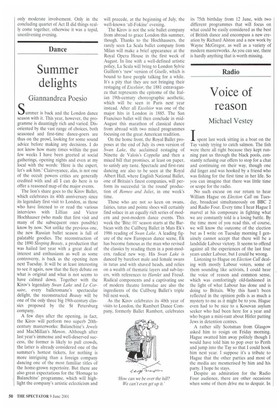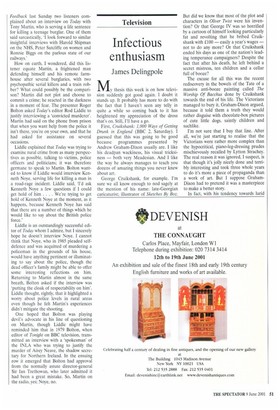Voice of reason
Michael Vestey
Ispent last week sitting in a boat on the Tay vainly trying to catch salmon. The fish were there all right because they kept running past us through the black pools, constantly refusing our offers to stop for a chat and continuing on their way, though one did linger and was hooked by a friend who was fishing for the first time in her life. So you can imagine that there was little time or scope for the radio.
No such excuse on our return to hear William Hague on Election Call on Tuesday, broadcast simultaneously on BBC 2 and Radio Four. Every time I hear Hague I marvel at his composure in fighting what we are constantly told is a losing battle. By the time most of you read this, of course, we will know the outcome of the election but as I write on Tuesday morning I genuinely cannot accept that there will be a landslide Labour victory. It seems to offend against all the experiences of the last four years under Labour, but I could be wrong.
Listening to Hague on Election Call dealing with mostly Labour voters, some of them sounding like activists, I could hear the voice of reason and common sense, which was comfortingly old-fashioned in the light of what Labour has done and is doing to Britain. Why this hasn't been reflected in the opinion polls is as much a mystery to me as it might be to you. Hague even had to be nice to a Kosovan asylum seeker who had been here for a year and who began a mini-rant about Hitler putting Jews in detention centres.
A rather silly Scotsman from Glasgow asked him to resign on Friday morning. Hague swatted him away politely though I would have told him to pop over to Perth and jump into the Tay so that I could hook him next year. I suppose it's a tribute to Hague that the other parties and most of the media are mesmerised by him and his party. I hope he stays.
Despite an admiration for the Radio Four audience, there are other occasions when some of them drive me to despair. In
Feedback last Sunday two listeners complained about an interview on Today with Tony Martin, who is serving a life sentence for killing a teenage burglar. One of them said sarcastically, 'I look forward to similar insightful interviews with Harold Shipman on the NHS, Peter Sutcliffe on women and Ronnie Biggs on the parlous state of our railways.'
How on earth, I wondered, did this listener equate Martin, a frightened man defending himself and his remote farmhouse after several burglaries, with two psychopathic serial killers and a train rob ber? What could possibly be the comparison? Martin did not plot and choose to commit a crime; he reacted in the darkness in a moment of fear. The presenter Roger Bolton asked Today's editor Rod Liddle to justify interviewing a 'convicted murderer'.
Martin had said on the phone from prison that when you want help from the police it isn't there, you're on your own, and that he had asked for assistance on several occasions.
Liddle explained that Today was trying to examine rural crime from as many perspec tives as possible, talking to victims, police officers and politicians; it was therefore germane to speak to Martin. Bolton want ed to know if Liddle would interview Ken neth Noye, serving life for killing a man in a road-rage incident. Liddle said, 'I'd ask Kenneth Noye a few questions if I could get hold of him . . . We're trying to get hold of Kenneth Noye at the moment, as it happens, because Kenneth Noye has said that there are a number of things which he would like to say about the British police force.'
Liddle is an outstandingly successful editor of Today whom I admire, but I sincerely hope he doesn't interview Noye. I cannot think that Noye, who in 1985 pleaded selfdefence and was acquitted of murdering a policeman in the grounds of his house, would have anything pertinent or illuminating to say about the police, though the dead officer's family might be able to offer some interesting reflections on him. Returning to Martin almost in the same breath, Bolton asked if the interview was 'putting the cloak of respectability on him'. Liddle thought, rightly, that it highlighted a worry about police levels in rural areas even though he felt Martin's experiences didn't mitigate the shooting.
One hoped that Bolton was playing devil's advocate in his line of questioning on Martin, though Liddle might have reminded him that in 1979 Bolton, when editor of Tonight on BBC television, trans mitted an interview with a 'spokesman' of the INLA who was trying to justify the murder of Airey Neave, the shadow secretary for Northern Ireland, In the ensuing row it emerged that Bolton had approval from the normally astute director-general Sir Ian Trethowan, who later admitted it had been a great mistake. So, Martin on the radio, yes; Noye, no.



































































 Previous page
Previous page